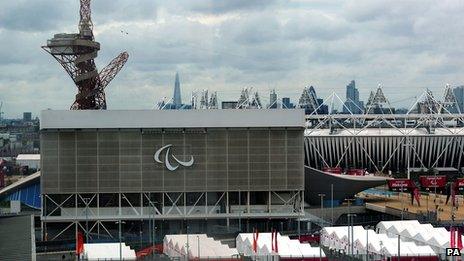Paralympic tickets on sale during Games
- Published

Changes have been made to the Olympic Park to make it ready for the Paralympic Games, which open on Wednesday
A batch of about 10,000 tickets for the Paralympics will be made available for sale each day during the Games.
Organisers said 2.4 million tickets of a possible 2.5 million have already been sold, making it likely these will be the first sell out Paralympic Games.
Games organisers Locog are giving out 800 tickets to troops and police for Wednesday's sold-out opening ceremony.
And the Mayor of London Boris Johnson has arranged for 1,100 free tickets to be given to London athletics clubs.
They have been distributed to about 50 clubs that will ensure about half of their tickets, which are for club members and volunteers, go to youngsters aged 16 or under.
"I'm delighted we have secured these tickets that will enable those people who spend time on the starting blocks or on sports fields around the capital to experience the joy of the Paralympics for themselves," said Mr Johnson.
The security threat level has been set as "substantial" for the Paralympics rather than "severe" as it was during the Olympics.
Met Police Assistant Commissioner Chris Allison said it was not a new development but one based on planning.
He said the focus of security would be on the same four areas - terrorism, serious and organised crime, protests and natural hazards.
There will be 7,500 police officers from five forces working on the Paralympics, with 6,000 in London.
During the Olympics, 14,500 officers from 11 forces worked on the Games, with 10,500 in London.
Police presence will be minimal at venues but increased around the capital and there will be 3,500 military personnel assisting with venue security, alongside 4,000 to 5,000 G4S staff.
"We think we're in a good place but we're not complacent," said Mr Allison.
He said the goal was to make the Paralympics as safe and successful as the Olympics.
Transport system
Transport for London commissioner Peter Hendy warned London would be busy during the Games, which run alongside football matches, Proms concerts and other events at a time when people are going back to school and work after the holiday period.
However he praised Londoners for helping to make the city's transport systems run smoothly during the Olympics.
"We are really grateful to everybody who uses the systems that when they were asked to do something different to make the Olympics work and to keep the city going, that was exactly what they did," he said.
"One of the most amazing statistics was that nobody fainted on the Underground system for three weeks.
"This was because the peaks were less crowded because people took our advice and made it easier to travel, more comfortable and more pleasant which is a real lesson."
Culture secretary Jeremy Hunt said: "The biggest thing I have learned from the Olympics is that we can do all the preparations in the world but in the end a great Games is made by the public and the athletes.
"The performance of Team GB in the Games was incredibly important to public perception of the Games but also the way the public made the atmosphere inside all the stadia was something we hoped would have happened but not something we could predict would have happened in quite the way that it did."
- Published29 August 2012
- Published23 August 2012
- Published20 August 2012